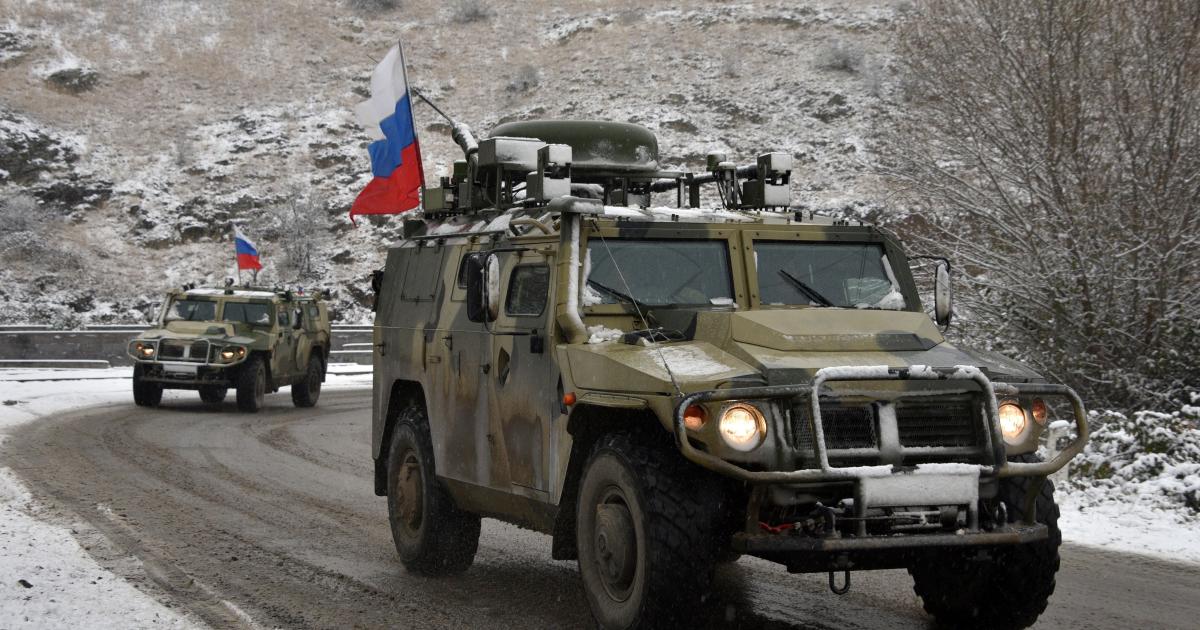
More than one year after the 2020 cease-fire agreement that brought the Second Karabakh War between Azerbaijan and Armenia to an end, tensions remain high between the two.
Just like the 1994 cease-fire that brought the first round of fighting to an end, Russia also brokered this cease-fire, and in so doing has dramatically expanded its presence in the region. However, it does not seem that Russia is willing to enforce the terms of its own deal.
As part of the terms of last year’s cease-fire agreement, Russia is allowed to deploy 1,960 troops as “peacekeepers” inside a small section of Azerbaijan, which is home to a small ethnic Armenian minority. This means that for the first time since 2012, Russia has troops in all three of the South Caucasus countries—Armenia, Azerbaijan, and Georgia—either by invitation or occupation.
The initial mandate allows Russian peacekeepers to stay until Nov. 2025. However, this can be renewed for another five-year mandate if both Baku and Yerevan agree. However, this is not as simple as it might seem.
Extending the Russian peacekeeping force in the region will not likely face many objections from the Armenian camp, but Azerbaijan will surely not favor it. If Russia decides it wants to extend its 2025 deadline, there may not be much Azerbaijan can do to stop this if Moscow puts pressure on Baku as it has in the past on other issues.
Looking at Russia’s track record in Moldova or Georgia, it is reasonable to assume that Russia will want to make its military presence “de facto permanent.” This would expand Russia’s military influence in the region and beyond.
Despite the presence of Russian peacekeepers in Azerbaijan, skirmishes between Azerbaijani and Armenian soldiers have sporadically broken out in the region. Fighting on Oct. 14 resulted in the death of an Azerbaijani soldier and six Armenian servicemen being wounded.
One of the recent examples of violence, which took place on Nov. 16, left seven Azerbaijani service members killed and 10 more wounded in clashes with Armenian troops. Armenian officials reported one casualty and 13 captured soldiers. A cease-fire was agreed upon by both sides but the situation remains tense.
These instances show that Russian peacekeepers are not effectively quelling violence.
Meanwhile, friction between Baku and Moscow has increased with the presence of peacekeeping troops. While Azerbaijani President Ilham Aliyev celebrated the end of the conflict and the “restoration of Azerbaijan’s territorial integrity,” members of his administration have signaled their discontent with the cease-fire agreement.
On Aug. 11, Azerbaijan’s Ministry of Defense voiced concerns, through a statement, about repeated cease-fire violations, which included Armenians setting up new military posts in the Karabakh.
“In accordance with the provisions of the trilateral statement, the peacekeeping forces of the Russian Federation must put an end to the deployment of the Armenian armed forces in the territories of the Azerbaijan Republic, where they are temporarily deployed,” the ministry statement said.
Russia responded by blaming Azerbaijan for allegedly violating the cease-fire and carrying out strikes against the Armenian Armed Forces in Karabakh.
Azerbaijan is also alarmed by Russian military drills taking place in Karabakh. One exercise focused on soldiers defending themselves from drones. Considering the crucial role drones played in Azerbaijan’s victory in last year’s war, a military exercise of this nature was sure to raise eyebrows in Baku.
More than ever, an enduring peace is needed between Armenia and Azerbaijan. Russia has not done enough to quell the violence between the two countries. Russia has also failed to lead on implementing the terms of last year’s cease-fire agreement that it helped to broker. This is especially true in the case of new regional trade corridors opening.
In the past, Russia has benefited from the conflict between Armenia and Azerbaijan. It allowed Moscow to have more influence in Baku and Yerevan and to sell weapons to both sides. While Russia would not want to see a return of major fighting, it is also unlikely to push for a lasting and enduring peace.
As long as there is tension between Armenia and Azerbaijan, Russia will have influence and soldiers in an increasingly important region in the world.
This piece originally appeared in The Daily Signal
"lasting" - Google News
December 03, 2021 at 11:36PM
https://ift.tt/3Dg5r4w
Russia's Influence in Azerbaijan Makes Lasting Peace Unlikely - Heritage.org
"lasting" - Google News
https://ift.tt/2tpNDpA
Shoes Man Tutorial
Pos News Update
Meme Update
Korean Entertainment News
Japan News Update
Bagikan Berita Ini














0 Response to "Russia's Influence in Azerbaijan Makes Lasting Peace Unlikely - Heritage.org"
Post a Comment